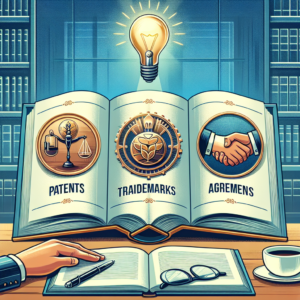Unraveling the Chaos: Shocking Truths Behind Music Copyright Disputes
[caption id="attachment_35121" align="alignnone" width="608"] Intellectual Property[/caption]
In an era where music is more accessible than ever, the complexities surrounding music copyright have become increasingly pronounced. As artists, producers, and record labels navigate the intricate web of rights and ownership, disputes have emerged that not only affect the parties involved but also resonate throughout the industry. This article delves into the chaotic world of music copyright disputes, exploring their foundations, trends, key players, notable cases, legal frameworks, and the future implications of technology on this critical aspect of the music business.
Understanding the Basics: What Constitutes Music Copyright and Its Importance
Music copyright is a legal framework that grants creators exclusive rights to their original works, encompassing both the composition (lyrics and melody) and the sound recording. This protection is vital for artists and producers, as it ensures they can control the use of their music, receive compensation for its exploitation, and maintain the integrity of their work. Copyright laws vary by jurisdiction, but they generally provide creators with the right to reproduce, distribute, perform, and display their music publicly. The importance of music copyright cannot be overstated; it serves as the backbone of the music industry, incentivizing creativity and innovation while safeguarding the economic interests of artists and stakeholders.
The Rise of Music Copyright Disputes: Trends and Statistics in Recent Years
In recent years, the music industry has witnessed a significant uptick in copyright disputes, fueled by the rapid evolution of digital platforms and the ease of music sharing. According to a report by the U.S. Copyright Office, the number of copyright infringement cases filed in federal courts has increased by over 30% in the past five years. This surge can be attributed to various factors, including the proliferation of user-generated content on platforms like YouTube and TikTok, where the line between inspiration and infringement often blurs. Additionally, the rise of sampling in music production has led to heightened scrutiny over the use of existing works, resulting in a growing number of legal battles as artists seek to protect their intellectual property.
Key Players in Music Copyright: Who Holds the Rights and Why It Matters
The landscape of music copyright is populated by various key players, each holding different rights and interests. At the forefront are the songwriters and composers, who typically retain the copyright to the underlying composition. Record labels, on the other hand, usually own the rights to the sound recordings, having invested in the production and marketing of the music. Performing rights organizations (PROs) such as ASCAP and BMI play a crucial role in collecting and distributing royalties for public performances. Understanding who holds the rights is essential, as it determines how revenue is generated and distributed within the industry. Disputes often arise when these parties disagree on the terms of usage, leading to complex negotiations and potential litigation.
Case Studies: Notable Music Copyright Disputes That Shook the Industry
Several high-profile music copyright disputes have captured public attention and highlighted the contentious nature of intellectual property in the industry. One notable case is the legal battle between Robin Thicke and Marvin Gaye's estate over the hit song "Blurred Lines." The court ruled in favor of Gaye's estate, ordering Thicke and his collaborators to pay $7.4 million in damages, a decision that sent shockwaves through the music community regarding the implications of copyright infringement. Another significant case involved Katy Perry's "Dark Horse," where a jury found that the song had infringed on a lesser-known track, resulting in a $2.8 million judgment against Perry. These cases underscore the precarious balance between artistic expression and copyright protection, raising questions about the boundaries of inspiration and originality in music.
The Legal Framework: Navigating the Complexities of Copyright Law in Music
Navigating the legal framework surrounding music copyright can be daunting, as it encompasses a myriad of laws, regulations, and international treaties. In the United States, the Copyright Act of 1976 serves as the foundation for music copyright, outlining the rights of creators and the duration of protection. However, the complexities arise when considering the various licensing agreements, such as mechanical licenses for reproduction and synchronization licenses for film and television. Additionally, the advent of digital distribution has introduced new challenges, as traditional copyright laws struggle to keep pace with technological advancements. Artists and stakeholders must remain vigilant and informed to protect their rights and navigate the often murky waters of copyright law.
Future Implications: How Technology is Shaping Music Copyright and Dispute Resolution
As technology continues to evolve, its impact on music copyright and dispute resolution is becoming increasingly pronounced. The rise of artificial intelligence (AI) in music creation poses new challenges, as questions arise regarding authorship and ownership of AI-generated works. Furthermore, blockchain technology is being explored as a potential solution for transparent and efficient royalty distribution, allowing artists to track their music's usage in real-time. Additionally, online dispute resolution platforms are emerging, offering a more accessible and cost-effective means for resolving copyright disputes outside of traditional court systems. As the music industry adapts to these technological advancements, the landscape of copyright and dispute resolution is likely to undergo significant transformation, potentially leading to a more equitable and efficient system for all stakeholders involved.
The chaotic world of music copyright disputes reveals the intricate balance between creativity and legal protection. As artists and industry professionals navigate this complex landscape, understanding the fundamentals of copyright, the key players involved, and the implications of technology is essential. While disputes may continue to arise, the ongoing evolution of copyright law and dispute resolution mechanisms offers hope for a more harmonious future in the music industry, where creativity can flourish alongside robust protections for intellectual property.
